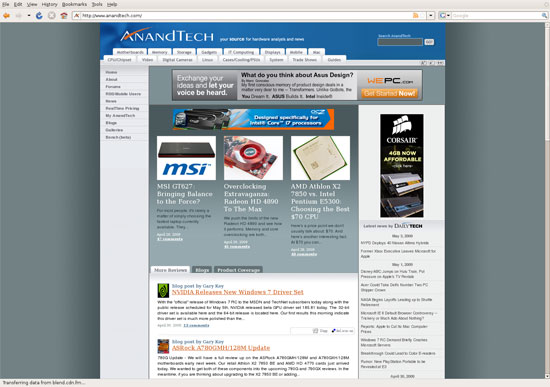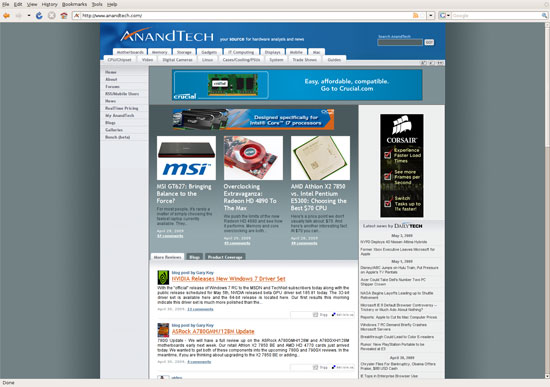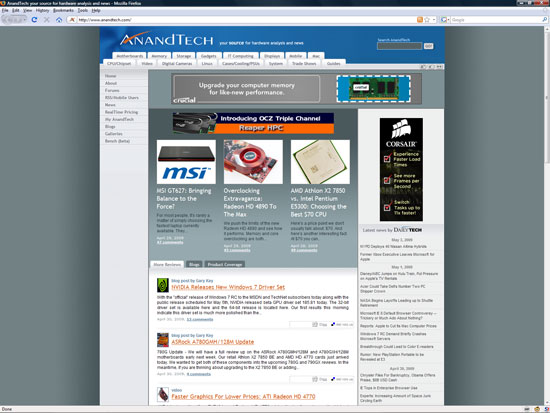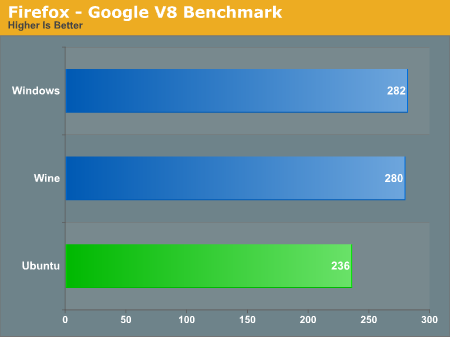Revisiting Linux Part 1: A Look at Ubuntu 8.04
by Ryan Smith on August 26, 2009 12:00 AM EST- Posted in
- Linux
Applications: Web Browsing
Windows Default: Internet Explorer 7
What I use: Firefox 3
Ubuntu Default: Firefox 3
Much to the chagrin of Microsoft, the web browser is turning in to a miniature OS of its own, and in the case of anything that’s not Internet Explorer, it’s a miniature OS that has no allegiance to a real operating system. It’s the primary way to retrieve most information from the internet, applications can be created through AJAX and Flash, video can be watched (see: Hulu). A good cross-platform web browser removes a great deal of the need to use any specific OS, and this is something that works in Ubuntu’s favor.
Ubuntu ships with Firefox 3, Internet Explorer’s loyal opposition and currently the #2 browser on the market. So long as a site isn’t built for IE6 Firefox has great compatibility, good speed, and an army of extensions to add features to it. Since many of you already use it, there’s not a lot to say here: it’s a very solid browser, and something I find to be superior to Internet Explorer.

As I already use Firefox under Windows, the transition here was virtually non-existent. Ubuntu doesn’t have any direct Windows to Ubuntu transition tools, but after moving my Firefox profile from Windows to Ubuntu and reconfiguring a few location-sensitive settings, I was up and going. Internet Explorer users are going to have more of a transition obviously, but it’s not much. All of the major browsers’ core behaviors are the same, which makes it easy to switch among them with little fuss.
At the risk of marginalizing the rest of Ubuntu, I consider Firefox to be one of the core components that makes Ubuntu a success story. Because so much computer use these days is inside a browser, it has become a lynchpin for a good OS. If your browser is bad, then it’s probably hurting the usability of your OS if it means that many users cannot do something they regularly do on another browser. One only needs to look at the early versions of Mac OS X to get a good picture of this, as it shipped with the only-bearable Internet Explorer 5.
There are however a few caveats that I’d like to hit on. Something that continues to throw me for a loop is that while it’s the same Firefox I use under Windows and Mac OS X, it doesn’t necessarily look the same. The rendering engine is the same, but OS differences start to play out here. Mac OS X, Windows, and Ubuntu all render text slightly differently, and in the case of Ubuntu come with a significantly different font set. Because Firefox is at the mercy of the OS for fonts, what you get are small but noticeable differences in how the same page looks.

Firefox with default fonts

Firefox with MS Core fonts

Firefox under Windows
Above we have AnandTech rendered in Firefox 3 on Windows, and Ubuntu. On Windows Firefox uses Times New Roman and Arial for its default fonts, but these fonts do not exist on Ubuntu; rather Ubuntu uses what’s called “serif” and “sans-serif”. This along with how the two OSs differ in font anti-aliasing results in the different look of Firefox under Ubuntu. Having used Windows for a number of years, I have never gotten past the idea of Ubuntu looking “wrong” even though the right look is entirely subjective.
Ultimately I ended up adding the missing fonts by installing the msttcorefonts package, which contains Times New Roman, Arial, and the other “big name” standard fonts. With those installed and Firefox configured to use them, text looks much closer, although not quite the same. It’s a shame that Ubuntu can’t include these fonts by default.
The second caveat is one of performance. When using Javascript-heavy sites in particular, Firefox on Ubuntu seems just a bit slower than under Windows. I had never been able to figure out why until I saw this Slashdot article. Firefox for Linux is not compiled with profile guided optimization, a method of improving the performance of binaries by looking at how they’re used. While Ubuntu compiles their own releases of Firefox, they do the same thing. As a result, there’s a speed difference in Firefox – it’s the same code, but the Windows version is compiled in such a way that it’s faster. As I wrote at the start of this article, I’m not concerned with the performance of Ubuntu or its applications for the most part, and this falls under that notion. Firefox is slower, but not to the point that I care. It’s interesting enough that it bears mentioning, however.
Just to give you an idea of what the speed difference is, here’s a breakout of one of our Firefox benchmarks from the benchmarking section later in this article:

As you can see, in this Javascript-heavy test Firefox on Ubuntu is upwards of 17% slower than it is under Windows. As this performance gap manifests itself largely under Javascript-heavy situations; regular browsing doesn’t show nearly the difference. Flash is also slower, but this has nothing to do with Firefox and more to do with Flash’s mediocre performance under any OS that isn’t Windows.
The last caveat is one of how Ubuntu’s distribution model becomes strained when it comes to Firefox. Ubuntu Hardy shipped nearly 2 months before Firefox 3 did. But because Ubuntu is meant to be a stable platform they still needed to package Firefox 3 with the OS, so Firefox 3 Beta 5 was included. If we had done this article a month after Hardy launched as intended, I’d have few nice things to say. Firefox 3 Beta 5 combined with Adobe Flash 9 was buggy, unstable junk. Canonical made the right decision as the final version of Firefox 3 turned out well, but it highlights the pitfalls of including 3rd party software with the OS.
The flip side of this caveat is that Firefox 3.5.x has superseded 3.0.x as the newest Firefox branch, which means that only 3.0.x versions are being pushed out to Hardy. This means if you want to take advantage of any of Firefox’s newest features such as the new javascript engine, you’ll need to install a 3.5.x build separately, ideally through a PPA package so that it cleanly replaces the default version of Firefox.
But even with those caveats, none of them are serious issues. Firefox 3 is still a fantastic browser and there’s nothing else I’d rather have on Ubuntu.
Final Verdict: Meets My Needs










195 Comments
View All Comments
brennans - Sunday, August 30, 2009 - link
I use both XP64 and Hardy (Ubuntu 8.04).I am also a power user.
Both these operating systems have pros and cons.
Cons for XP64:
1. It does not recognize my hardware properly.
2. Finding 64 bit drivers was/is a mission.
Cons for Hardy:
1. It does not plug and play with my hardware (i have to compile the drivers).
2. Not as user friendly as windows.
Pros for XP64:
1. Windowing system is super fast.
2. User friendly.
Pros for Hardy:
1. Recognizes my hardware.
2. Command line tools are awesome.
Conclusion:
I think that the article was good.
I am one of those people who has always had problems installing windows straight out of the box and thus find that paying a large amount of money for their buggy OS is unacceptable.
I can get a lot of stuff done with Hardy and it is free and if I find a problem with it I can potentially fix that problem.
I also find it unacceptable that manufacturers do not write software (drivers or application software for their devices) for Linux.
For me, it is difficult to live without both XP64 and Hardy.
ciukacz - Sunday, August 30, 2009 - link
http://www.iozone.org/">http://www.iozone.org/JJWV - Sunday, August 30, 2009 - link
How can people use something like Aero and its Linux or OSX equivalents (that pre-dates it if I am not mistaken) ? The noise is just hiding the information. Transparency is one issue, another are those icons that are more like pictures : one looses the instant recognition. With Aero knowing which is the active window is not something obvious, you have to look at small details. The title of the window is surrounded by mist making it more difficult to read. Even with XP the colour gradient in a title bar is just noise : there is no information conveyed by it.The OS GUIs are more and more looking like those weird media players, with an image of rotary button that is to be manipulated like a slide button.
The evolution of all applications to a web interface reminds me of the prehistory of personal computers : each program has its own interface.
The MS Office Ribbon UI is just in the same vein: more than 20 icons on each tab. The icon interface is based on instant recognition and comprehension, when you have so many it turns into a mnemonics exercise. And of course with MS one does not have a choice : you just have to adapt to the program. An end user is only there to be of service to the programs ;-)
If i want to look at a beautiful image I will do it, but the when I want to write an letter or update a database all those ultra kitsch visual effects are just annoying.
As a summary the noise is killing the information and thus the usability.
Ronald Pottol - Saturday, August 29, 2009 - link
The thing with windows has been seen before, back in the win 3.1-OS/2 days it was found that while one instance of excel didn't run any faster under OS/2, two in separate VMs (ok, not technically the same thing) ran in about the same time as one on windows.I like the package management, and hate when I have to install something that doesn't support it, it means I have to worry about updates all my self. If they have one, they I get updates every time I check for Ubuntu updates, very handy. Nice to get the nightly Google Chrome builds, for instance (still alpha/very beta).
Frankly, supporting binary kernel drivers would be insane. Now they are stuck supporting code they cannot look at and cannot fix, they cannot fix their mistakes (or are stuck emulating them forever). If they supported them, there would be even more of them, and when they wanted to fix something broken or that was a bad idea, they would have to wait a reasonable amount of time before doing it, so it would be supported. Frankly, I don't see why people don't have automated frameworks for doing this and automated deb/rpm repository generation. I add their repository, when I get a kernel update, perhaps it is held up a day for their system to automatically build a new version, but then it all installs, instead, I am stuck with having to run a very old kernel, or not having 3D on my laptop, for instance.
cesarc - Sunday, August 30, 2009 - link
I found this article very interesting, because is oriented to windows user and is helpful to them because you just didn't die trying it.But you can't blame ubuntu (or any distro), about the pain in the ass a video card's drive could be to install, blame ati and nvidia for been lazy, and if using wine for playing games is not as good as playing in windows blame games company for don't release a GNU/linux version.
Also, the thing about why GNU/linux overpass windows in file management is because ntfs is a BAD file system, maybe if windows somehow could run under ext3 would be even better than it is.
And why your negligence to use a console (stop saying cli please), you are not opening your mind trying to use GNU/linux as a windows just because it is not windows is a completely different os. Look from this point of view... something that you can do in windows with 5 clicks maybe you can do it in GNU/linux in just one line of bash code. So, sometimes you will use GUI and others you will use console and you will find that having this options is very comfortable. So start using the console and do the same article a year later.
I hope some day have a paid version of GNU/linux (still open source), that could pay salaries to programers to fix specific issues in the OS.
In the other hand, when you do the IT benchmark is very disappointing that you don't use linux with those beautiful Xeons. Servers environment is were GNU/linux get stronger. And Xeons with windows are just toys compared with unix on sparcs or power architectures.
PS: try to get 450 days of uptime in a windows 2003.
rkerns - Saturday, August 29, 2009 - link
Ryan,Thanks for your good work.
Many people considering linux are still on dial-up. These are often folks with lesser expertise who just want to get connected and use their computer in basic ways. But getting connected with dial-up is something of an adventure with many distros and/or versions. Ubuntu 9.04 has moved away from easy dial-up, but Mint7KDE includes KPPP for simple dial-up connection. Mint7KDE has other nice features as well.
I am asking you to expand your current picture of the landscape to include people who want to use linux with a dial-up connection. This of course would have to include a brief discussion of 1) appropriate modems and 2) distro differences. Thanks,
r kerns
William Gaatjes - Saturday, August 29, 2009 - link
GRATIShijg hijg hijg hijg
hijg hijg hijg hijg
lgude - Saturday, August 29, 2009 - link
Really glad to find this in depth article after all this time. Thank you Ryan. I too have run Ubuntu as my main OS even though most of my experience is in Windows and have had similar experiences. Because this was a very long article it got into detail about things like the Package Manager or the multiple desktops that I have not seen discussed elsewhere from a user perspective. As someone else pointed out it is moot what people would like or complain about if they were moving from Linux to Windows or OSX, but imagine for a moment if they were used to getting the OS and all their apps updated in one hit and were asked to do it one app at a time and expected to pay for the privilege!If you go on with the Linux series I'd like to see discussion of the upcoming Ubuntu and other distros - I've been impressed with SUSE. I'd also like to see projects on how to build a Linux server and HTPC - including choice of distro and the kind of hardware needed. I'm less sure of where benchmarking is really useful - the tradition of detailed benchmarking at AT arose from the interest in overclocking and gaming which I think is a much lesser consideration in Linux. More relevant might be comparisons of netbook specific distros or how to work out if that old P4 will do as a home server. There is a lot of buzz in the tech world about things like Symbion, Chrome OS, Moblin, Maemo on portable devices that could possibly draw new readers to the Linux tab at AT. A great start in any case.
jmvaughn - Saturday, August 29, 2009 - link
I just wanted to say thank you to the author for a very thorough article. After reading it, I decided to use Ubuntu for a PC I'm building out of spare parts for a retired friend who's on fixed income. My friend just uses web, e-mail, and some word processing, so this will be perfect.The article gave me a good idea of what to expect -- a good honest appraisal with all the good and bad. After installing Ubuntu 9.0.4, I am very impressed. The install was very quick, and easier than XP. Everything is quite snappy, even though it's running on a AMD 3800+ single core processor and an old hard drive.
xchrissypoox - Saturday, August 29, 2009 - link
I only skimmed the article (I saw the part on gaming being poor), I'd like to see a comparison of several games using the same hardware on windows and linux (results given in fps). If this has been mentioned sorry and good day.